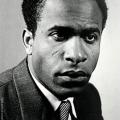106. Combat Literature: Franz Fanon’s Wretched of the Earth
Fanon’s incendiary final work explores the violent process of decolonization.
Themes:
• F. Fanon, Toward the African Revolution, trans. H. Chevalier (New York: 1967).
• F. Fanon, The Wretched of the Earth, trans. R. Philcox (New York: 2004).
---
• A.C. Alessandrini (ed.), Frantz Fanon: Critical Perspectives (New York: 2005).
• H.A. Bulhan, Frantz Fanon and the Psychology of Oppression (New York: 1985).
• A. Cherki, Frantz Fanon: a Portrait, trans. N. Benabid (Ithaca: 2006).
• I.L. Gendzier, Frantz Fanon: a Critical Study (New York: 1973).
• N. Gibson, Fanon: The Postcolonial Imagination (London: 2017).
• N.C. Gibson and R. Beneduce (eds), Frantz Fanon, Psychiatry and Politics (London: 2017).
• P. Hudis, Frantz Fanon: Philosopher of the Barricades (London: 2015).
• C.J. Lee, Frantz Fanon: Toward a Revolutionary Humanism (Athens, OH: 2015).
• D. Macey, Frantz Fanon: a Biography (London: 2012).
• P.K. Nayar, Frantz Fanon (London: 2013).
• R. Rabaka, Forms of Fanonism: Frantz Fanon’s Critical Theory and the Dialectics of Decolonization (Lanham: 2011).
Stanford Encyclopedia of Philosophy: Frantz Fanon






Comments
Reviving HOPWAG quiz
I'm not sure where I commented earlier on the HOPWAG quiz, but a friend pointed me to this: https://freerice.com/categories/philosophy
Can the philosophy quiz here perhaps be HOPWAG-aligned and rebranded as HOPWAG Freerice quiz? Many questions already have context in the HOPWAG episodes, and seem to cover a global history of philosophy.
Franz Fanon
Franz Fanon has been in the news recently. At least in my information bubble. Relating to Israel and Gaza. A first group of people used Franz Fanon to help explain the conflict there. Colonialism, settlers, second class indigenous peoples, violence as a means to reclaim their land. Citing Algeria and Kenya as situations where violent resistance was successful. Then a second group of Jewish people tried to explain why the situation with Israelis and Palestinians was different. Jews have always been in Israel, so they're not settlers. The French in Algeria and the British in Kenya were minorities and militarily weak, which is not the case for Israelis. And most importantly, the French and British had a "home" to go back to. Not the case for Israelies. So these people say. "We will die here rather than leave".
Even in Algeria and Kenya, I'm not sure it's fair to say the French and British should have gone home. Some of those people might say "I was born and raised here, my father was born and raised here. This is my home." Myself, I was born and raised in the UK and generally people don't think it's fair to tell me to go back home to Africa. Then again if you participate in a corrupt colonial system that benefits you, to the disadvantage of the majority, perhaps it is fair. One thing I've learned recently is that about half the Israeli population is descended from jews who were kicked out of the Arab world after the 1948 war. Another way to put that is ethinically cleansed from the Arab world. If they were to go "home", it would be to back to the Arab world.
This second group of people think that Palestinians, or Hamas, could be waging a fundamentally wrongheaded campaign. A Franz Fanon inspired campaign that is destined to fail, because the Palestinian mindset fundamentally misunderstands how Israelis think. A mindset that says if we commit enough violent atrocities, you will eventually give up on your occupation and go home. Maybe that is the Palestinian campaign, maybe not, In Vietnam, the Communist Vietnamese didn't fight the US on the battlefield, they wanted to fight them on US television. If the US people saw enough dead bodies returning from Vietnam, eventually the American public's appetite for war would wane and the US would leave. Which seems to be what happened. Perhaps in a similar way Palestinians, or Hamas, were looking to provoke a retaliation which would turn the world against Israel. A battle for world opinion, played out this time on social media rather than TV, which if successful, woud leave Isarel a pariah state, which would lead to change.
Whatever is the case, the Jewish people I heard were not complimentary about Fanon. Some might say that being the colonial oppressors, of course there going to object to Fanon.
Add new comment